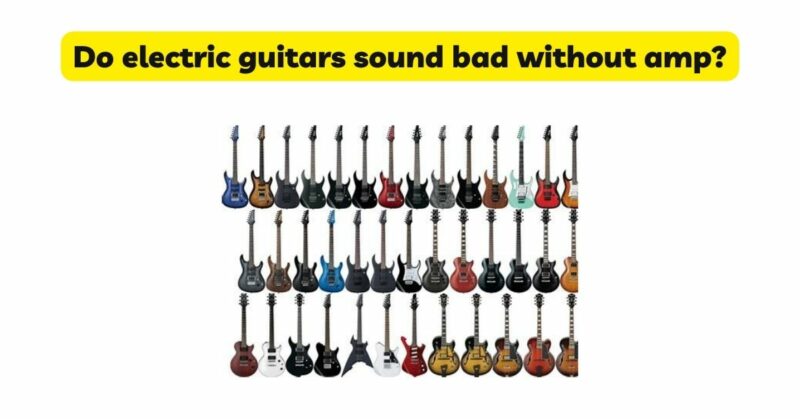Electric guitars have become synonymous with powerful and iconic sounds, thanks in part to the amplification systems that bring them to life. But what happens when you play an electric guitar without an amplifier? Do electric guitars sound bad without an amp? In this article, we will delve into the sonic characteristics of electric guitars without amplification and explore the factors that contribute to their overall sound. Whether you’re a guitarist curious about playing without an amp or simply seeking to understand the nuances of electric guitar tone, read on to uncover the truth behind the “unplugged” experience.
The Role of Amplifiers in Electric Guitar Sound: Amplifiers play a significant role in shaping the sound of electric guitars. They take the electrical signal produced by the guitar’s pickups and increase its volume, while also adding tonal coloration and various effects. Amplifiers contribute to the unique characteristics associated with electric guitar tones, such as distortion, overdrive, and the ability to sustain notes. These qualities have become an integral part of the electric guitar’s sonic identity.
The Unplugged Experience: When you play an electric guitar without an amplifier, the sound you hear is the raw, unamplified output of the instrument. Without the amplification and signal processing provided by an amp, the sound may seem thin, lacking in volume, and lacking the tonal complexity typically associated with electric guitars. However, it’s important to note that “sounding bad” is subjective, and the unplugged experience can offer its own set of unique characteristics and benefits.
Acoustic Qualities of Electric Guitars: Electric guitars are designed to be played with amplification, and their construction differs from that of acoustic guitars. Acoustic guitars are built to resonate and project sound acoustically, while electric guitars focus on capturing and transmitting the instrument’s vibrations to pickups. As a result, the acoustic qualities of an electric guitar without an amp may not match those of an acoustic instrument. The lack of a resonating body can make the sound seem quieter, less dynamic, and less rich in harmonic content.
Focusing on Technique and Articulation: Playing an electric guitar without an amp can be beneficial for certain aspects of your playing. Without the distractions of amplification and effects, you can focus more closely on your technique, precision, and articulation. This stripped-down approach allows you to hear the natural sound of the strings and concentrate on developing your playing skills. Practicing without an amp can reveal any imperfections in your technique, enabling you to refine your playing and improve your overall sound.
Exploring the Clean Tone: One advantage of playing an electric guitar without an amp is the opportunity to explore its clean tone. The absence of distortion and other effects can provide a clearer and more transparent sound, allowing the true character of the instrument to shine through. Clean tones are highly valued in certain musical genres and can be achieved effectively without amplification. Playing unplugged can help you develop a strong foundation in clean playing, which can later be enhanced and shaped with amplification.
Creative Possibilities: While electric guitars may not produce their signature high-gain, saturated tones without an amp, playing unplugged opens up creative possibilities. You can experiment with different playing techniques, such as fingerpicking, tapping, or percussive strumming, to create unique sounds and textures. Additionally, by manipulating the guitar’s volume and tone knobs, you can achieve subtle variations in timbre and dynamics. These creative explorations can lead to new musical ideas and inspire innovative playing styles.
Alternative Amplification Options: If you enjoy the convenience of playing without an amp but still want to capture the essence of electric guitar tones, there are alternative amplification options available. Headphone amplifiers, direct recording interfaces, or amp simulators in digital audio workstations (DAWs) allow you to emulate the sound of amplifiers and effects while playing silently or recording directly. These options offer flexibility and convenience, enabling you to achieve authentic electric guitar tones without the need for a traditional amplifier setup.
Conclusion: While electric guitars may not deliver their full sonic potential without an amplifier, it would be inaccurate to say that they sound inherently bad without one. Playing an electric guitar unplugged provides a different experience that allows you to focus on technique, explore clean tones, and unlock creative possibilities. The absence of amplification highlights the natural sound of the instrument and can lead to a deeper understanding of its sonic characteristics. Ultimately, the choice to play with or without an amp depends on your musical goals, context, and personal preferences. Embrace the versatility of the electric guitar and experiment with different amplification options to discover the tones that inspire you.


